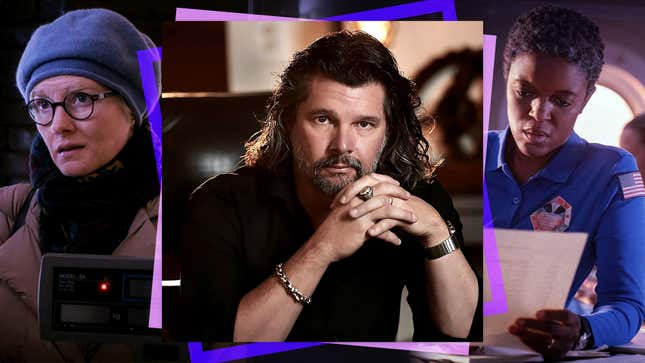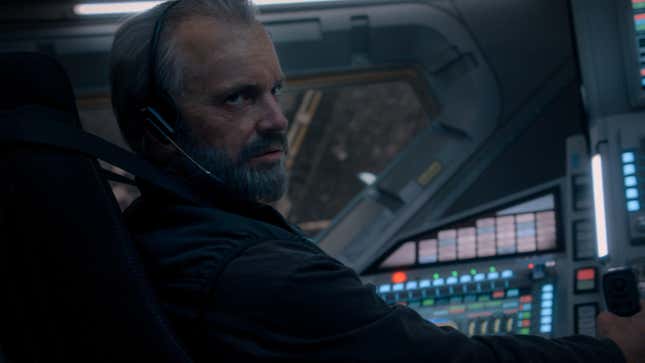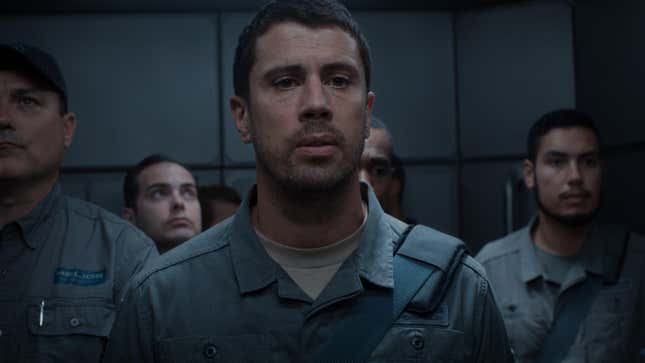
If there’s one thing For All Mankind is known for, it’s making astounding leaps in its alternate history between seasons. In that respect, the Apple TV+ drama doesn’t disappoint in its fourth season, which kicks off in 2003, when humans have already set up a successful base on the moon and on Mars and are trying to hurl asteroids into orbit to extract minerals.
As always, the series balances sci-fi with grounded drama (sometimes a little too much this time around). On the Red Planet, astronauts argue amongst themselves while facing a potential rebellion from the low-level workers. Meanwhile, back on Earth, the U.S. and the Soviet Union continue their space race. Things are getting complicated in the new episodes, which drop every Friday through January 12.
The A.V. Club spoke to series creator Ronald D. Moore about planning this season, how the rest of the episodes might play out for OGs like Ed Baldwin (Joel Kinnaman) and Margo Madison (Wrenn Schmidt), and what ideas Moore is already brewing for the show’s next chapter.
The A.V. Club: What was the process of planning For All Mankind’s scope at this point? How far did you want to take it on Mars, because there’s so much happening at Happy Valley?
Ronald D. Moore: We had a general idea going into the season of what Happy Valley’s state was. For practical reasons, we didn’t want to expand it too much over one season. We had an idea of where we wanted season four to end, making some general planning difficult. It became about logistics, like how much we had to spend and how much time it would take to build certain sets. But we knew pretty early what the size of the [Mars] compound would be. We wanted the upstairs-downstairs quality of it, so we spent some time trying to work out how that would look on camera, what the upper-level astronaut quarters were like and the world that they lived in was like, and then building out what place the miners worked in and what their existence was. We spent a fair amount of time trying to differentiate those two.
AVC: FAM’s alternate history is depicted with sci-fi and technological advancements. Do you feel pressure to evolve the show in a particular way to make it feel different or more exciting than our real life?
RDM: Certainly from within the show, we challenge each other about how far we can go. We had those conversations since year one. Once we said we wanted to accelerate the advancement in technology, you can quickly get into big conversations of, “Okay, which sections, how fast, and how fast is too fast?” You start getting into expansive talks about, “Well, when are flat screens going to show up in this world? They could be invented, but you have to have an industrial base to make the plasma screens, and does that exist here?” There is a certain amount of sociological planning we do in the writers’ room.
On another level, you then have to ask, “Does it really matter?” We need to do what we think works dramatically and we can pretend some of these problems were solved easier than they probably ever could have. We just want to show consistent technological change moving at a rapid pace.
AVC: So much time has passed in the show’s world with an eight-year jump between seasons three and four. What’s it like to plan arcs for original characters like Ed, Dani, and Margo now that they’re much older? Did you consider closing their journeys out and introducing more new characters instead?
RDM: That’s a conversation we need to have every season. Usually, we ended up pretty much where we wanted to at the end. But also season two is a good example of how we have to be open to stories as they organically change. That’s why Gordo [Michael Dorman] and Tracy [Sarah Jones] suddenly died at the end of season two. It wasn’t part of the plan, but it felt right. With Ed, Dani [Krys Marshall], and Margo, we start at the beginning of season four with an idea of where we want them to be by the end. We kicked around a lot of other ideas, like maybe Ed dies in this way. Various options came and went. It’s the give and take of being in the writers’ room.

AVC: Ed’s journey is particularly interesting because of the slow shift in his mindset after Dani comes to Mars. What is the significance of someone like him, who has devoted his life to the space race, eventually reaching a breaking point?
RDM: We really wanted to challenge Ed. We wanted to shake him to his core. So much of his identity is built around being an astronaut, a pilot, and being in space. He was reaching a point in his life where, on a physical level, that was starting to be thrown into question. On a psychological and emotional level, we wanted to break the character down. What if everything suddenly blew up in his face? How would he react? He doesn’t usually react in the best ways—that’s Ed Baldwin. But there’s a moral center to him, and we wanted to see what he takes from the ashes of that.
AVC: Margo is going through that, too, albeit in a different way. When the season begins, she’s alone, isolated, and older, living in the Soviet Union. Eventually, she’s drawn back into a world she’s familiar with, but why was it important to see that aspect of her life?
RDM: Once we put her in the Soviet Union, we absolutely knew we wanted to follow that story. She’s been there for eight years, but to the audience, it’s very new. So we wanted to take a minute and allow the viewers to see what her life there was like. It also gave us a chance to see how the Soviet Union has developed in this time, and what it would be like in our version of 2003. We wanted to enjoy that for a little bit of time before we brought her back into the circle.
AVC: Was it challenging to figure out how to fill the void of Ellen Wilson’s [Jodi Balfour] absence beyond the season-opening montage?
RDM: Yes, it was. We felt her absence in the show because she was one of the key characters from the beginning. But it also felt like the end of her story to some extent. We might see her again in the series. I’m not saying she can never come back. But once you know she’s been President for two terms, and now she’s an ex-POTUS, it didn’t feel like there was a way to comfortably make her part of the ongoing drama.
AVC: There’s a labor movement brewing on Mars in season four. How did you land on this storyline?
RDM: It kind of just grew naturally out of the idea of there being that upstairs-downstairs quality. The people there who are doing the grunt work, as it were, are civilians. This is just a job; they’re not space explorers. They didn’t come here to do that. Now you start getting into questions of what their working conditions are, what are their hours. They are employed by a private contractor, Helios, who promises bonuses, but they can change their pay scale on a whim for whatever reason. So it felt like a natural place to start telling a story about labor, capitalism, and how that was going to go out into space exploration. We had touched on things like this back in Battlestar Galactica. There’s a strike in one of those episodes as well. Again, it came out of a natural environment of what was going on with these characters.

AVC: Speaking of Battlestar Galactica and For All Mankind, they both have these extremely real, human elements that blend in with sci-fi. What appeals to you about that mix?
RDM: I think that’s the key that allows the audience to give themselves over to the show. There’s a hardcore sci-fi audience who find the technology involved fascinating, but there’s a chunk of the audience that comes to it simply for the characters. We are attracted to having both of those elements, but the characters lead in our writers’ room. We always start with who are these people. In my opinion, that’s why the audience keeps coming back. They want to see these people and what the story is they’re involved with. They have to have an emotional connection to these people. That was a hallmark of what we did on Battlestar Galactica. Even on Star Trek, it was always about how the story affects the people.
AVC: FAM is the type of show where you can now achieve so much in space. They’re already on Mars, they’re trying to capture asteroids. Have you thought about what else you can do? What part of space do you want to conquer next?
RDM: Yes, we have a lot of ideas. Space is big, as they say. [Laughs] There are a lot of other planets, there are a lot of things still to explore, and more horizons to check out. There’s a lot of exciting things to do after season four.
AVC: Would you ever want to introduce a whole new group of characters because some favorites are now aging? Would you want to do what season one did by training a new set of astronauts?
RDM: Could be. Say that going forward, we do another decade jump into the next era. Well, now space travel is really starting to change, so the training involved changes. Is there even less training as space travel becomes more common? How much training do they need to do? Even now, you’re dealing with space tourism as a thing. People are going to space hotels even in season three without going through years-long training programs. There’s going to be the element of astronauts that are out on the bleeding edge, the ones who might be going to, say, Saturn or something, and going through intense training for that kind of a mission. How it would be different than it is today is an interesting question.
AVC: Can you tease whether or not the way season four ends is a set-up to where the show might go next if it’s renewed, as has been the tradition?
RDM: Yes, season four definitely has a fairly substantial finale. It also will tee up where the show could go next.
For All Mankind is available to stream now on Apple TV+